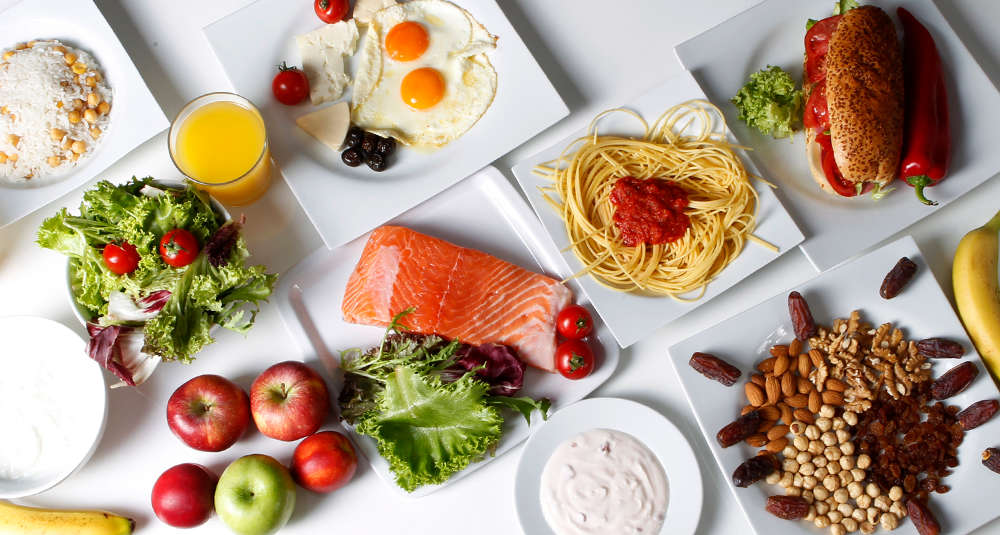"U.S. News & World Report" just released their annual list of the healthiest diets for the new year... and it looks like the the Mediterranean Diet is #1 for the eighth year in a row. Maybe it's worth a shot if it keeps winning?!
Here are the five they say are the healthiest diets overall.
1. The Mediterranean Diet: Limit sweets, processed foods, and red meat. Eat lots of fruits, veggies, grains, nuts, and healthy fats like chicken and fish. The Mediterranean diet is a style of eating that's based on the traditional eating habits of people living in countries near the Mediterranean Sea. It emphasizes eating minimally processed, plant-based foods, and includes:
Fish- Fish and shellfish are the preferred source of animal protein, and should be eaten at least twice a week
Nuts- A source of unsaturated fat, which can lower cholesterol levels
Olive oil- Extra virgin olive oil (EVOO) is the primary source of fat, and is considered a key bioactive food
Dairy and cheese- A moderate amount of natural cheese and yogurt, but it's recommended to prioritize low fat and non fat options
Wine- A moderate amount of wine with meals
Fruits and vegetables- A large amount of fruits and vegetables, which provide water and potassium salts to balance water levels and counteract acids from animal proteins
Whole grains-A good amount of whole grains, such as whole-wheat bread, brown rice, farro, bulgur, barley, and quinoa
Legumes-Beans, peas, and lentils, which are good sources of protein and fiber, and can replace meat
2. The DASH Diet: It's designed to lower blood pressure. "DASH" stands for "Dietary Approaches to Stop Hypertension." The DASH diet is a dietary pattern designed to lower blood pressure and reduce the risk of heart disease and stroke. It focuses on consuming nutrient-rich foods while limiting unhealthy ingredients.
Key Components of the DASH Diet:
Healthy Fats: Olive oil, avocado oil, and nuts and seeds (2-3 servings per day)
Fruits and Vegetables: Abundant intake of fresh, frozen, or canned fruits and vegetables (at least 4-5 servings per day)
Whole Grains: Whole wheat bread, brown rice, quinoa, and other whole grains (6-8 servings per day)
Low-Fat Dairy: Milk, yogurt, and cheese (2-3 servings per day)
Lean Protein: Chicken, fish, beans, and nuts (2 servings per day)
3. The Flexitarian Diet: You're mostly a vegetarian, but sometimes eat meat. A flexitarian diet is a semi-vegetarian diet that emphasizes plant-based foods while allowing occasional consumption of meat or other animal products.
Key Features:
- May include dairy products, such as milk, cheese, and yogurt.
- Allows for flexibility and customization, as individuals can adjust their meat intake and other dietary choices based on their preferences and lifestyle.
- Primarily plant-based, with fruits, vegetables, whole grains, legumes, and nuts as the foundation.
- Moderate to low intake of meat or animal products, typically limited to a few days per week.
- Focus on lean protein sources, such as fish, poultry, and eggs when meat is consumed.
Benefits:
- May promote weight loss and improved body composition
- May reduce the risk of chronic diseases, such as heart disease, type 2 diabetes, and some types of cancer
- May improve environmental sustainability by reducing meat consumption
4. The MIND Diet: It's a mash-up of Mediterranean and DASH, with a focus on brain health. ("MIND" stands for "Mediterranean-DASH Intervention for Neurodegenerative Delay.") The MIND diet is a diet that combines elements from the Mediterranean and DASH diets to promote brain health. The diet emphasizes eating certain foods and limiting others, with the goal of reducing the risk of Alzheimer's disease and slowing cognitive decline:
-
Foods to eat
- Vegetables: Eat at least two servings of vegetables per day, including one serving of leafy greens. Leafy greens are rich in nutrients and may reduce the risk of cognitive decline.
- Berries: Eat berries over other fruits because of their antioxidant properties.
- Whole grains: Eat three servings of whole grains per day.
- Nuts: Eat one ounce of nuts or nut butters per day.
- Fish: Eat at least one serving of fish per week, preferably fatty fish like salmon, sardines, trout, tuna, or mackerel.
- Beans: Eat beans in at least four meals per week.
- Poultry: Eat chicken or turkey at least twice per week.
- Olive oil: Use extra virgin olive oil as your main cooking oil.
5. The Mayo Clinic Diet: A three-month program for weight loss. You eat balanced meals with smaller portions, and can't eat while watching TV.
The Mayo Clinic Diet is a 12-week program broken up in two phases. With the help of the Mayo Clinic's unique food pyramid, which emphasizes fruits, vegetables and whole grains, you recalibrate your eating habits. In general, these foods have low caloric density, meaning you can eat more while taking in fewer calories. Think of it this way: For about the same amount of calories, you could have one-quarter of a Snickers bar or about 2 cups of broccoli.
Foods List


